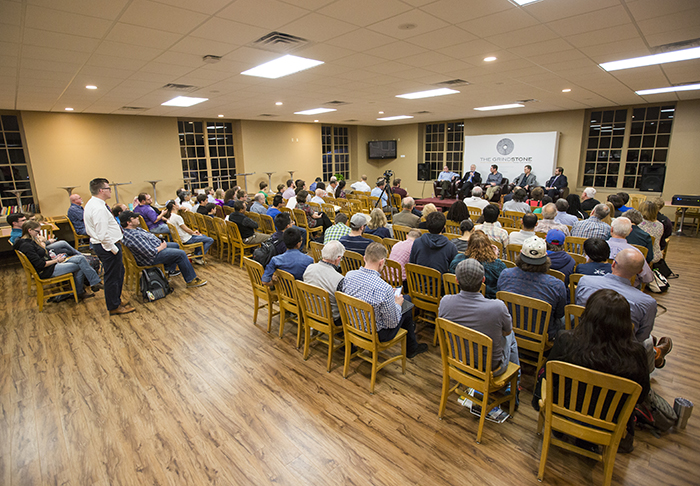Grindstone explores relationship between faith and science

During a Grindstone panel discussion on the relationship between faith and science, John West argued that all scientific progress is made within a de facto design paradigm. That is, even Darwinists, insofar as they are making progress in understanding things, are actually working under the assumption—though unintentionally—that the universe has a creator.
“Your operating assumption of science when you look at things is that, actually, things are working somehow, and then I’m going to figure out how,” explained West, vice president and senior fellow of the Discovery Institute. “That’s actually applying a design approach. I’d say the very heart of the scientific method actually presumes intelligent design.”
West proceeded to relate the experience of a biologist who worked in a lab, reverse-engineering biochemical systems. Explaining this process, West said, “You actually assume, for the sake of understanding it, that the things are there for a purpose, that they’re actually working together in an integrated system, and you try to reverse-engineer it and understand it from a design paradigm.
“That’s what science largely is about. It’s not telling stories of what happened 5 billion years ago; it’s actually, ‘How do things operate now?’ And that is applying a design approach. And so [the biologist] said the reason he gravitated toward intelligent design is that it actually fit with what he was doing in the lab.”
The Grindstone panel in which West participated was part of the Science & Faith Conference at Southwestern Seminary, Feb. 23. The conference was co-sponsored by the seminary’s Land Center for Cultural Engagement and the Discovery Institute. The Grindstone capped off the day-long conference and allowed students and conference participants to ask any questions they had remaining.
The other panelists were Michael Keas, professor of the history and philosophy of science at Southwestern; Douglas Axe, director of the Biologic Institute; and Ray Bohlin, vice president of vision outreach with Probe Ministries. Associate Professor of Ethics at Southwestern Evan Lenow moderated the panel.
Regarding how Southwestern is preparing believers to engage in faith/science discussions, Keas noted such programs as the seminary’s master’s degrees in apologetics and philosophy. “We’re here to equip young men and women to be savvy on these issues,” he said, “and of course, when they put the scientific questions in full context, they’re going to develop a theology from Scripture that will be able to place this scientific information in a theological context.”
Asked to name the one thing he wants “people in the pew” to understand regarding science and faith, Axe said he would like to instill confidence. “And the way I think we get confidence is just understanding how powerful the simple arguments are,” he said. “Jesus didn’t come giving us theories and formulae; He came giving simple, powerful truths. And they were rejected by the academics of the day, but He didn’t go that way. He stayed with the simple, powerful truths. I think that’s the lesson for us.”
One question from the audience dealt with whether faith/science discussions should be evangelistic. In response, Bohlin said, “With intelligent design, you’re looking at the scientific evidence and trying to determine, ‘Is this best explained by an intelligent cause?’” Identifying the intelligent cause, Bohlin continued, is not the scientific question, for such a question cannot be answered scientifically.
However, Bohlin proceeded to say, “When I am on a secular university, I am routinely asked, ‘Who do you think the designer is?’ And I always answer that question, ‘Well, I’m not afraid to tell you, but you need to understand the distinction: the science doesn’t tell me that; the scientific evidence only tells me that this event, this cause requires intelligent pre-programming, if you will.’
“To answer the question of who, I need to bring in philosophical, even theological perspectives. And I do admit that, from my perspective, what I see in science is consistent with the God of the Bible.”
Ultimately, Bohlin advised, Christians should ask good questions—such as how to tell right from wrong, what happens after death, and where everything came from—and then listen to people’s answers. “People love to be listened to,” Bohlin said. “And as a result, they will often then respond, ‘Well, you know, I’ve been talking a lot about what I think. So how would you answer that question?’”



